最新The_Monster课文翻译
Unit7TheMonster课文翻译综合优质教程四.docx
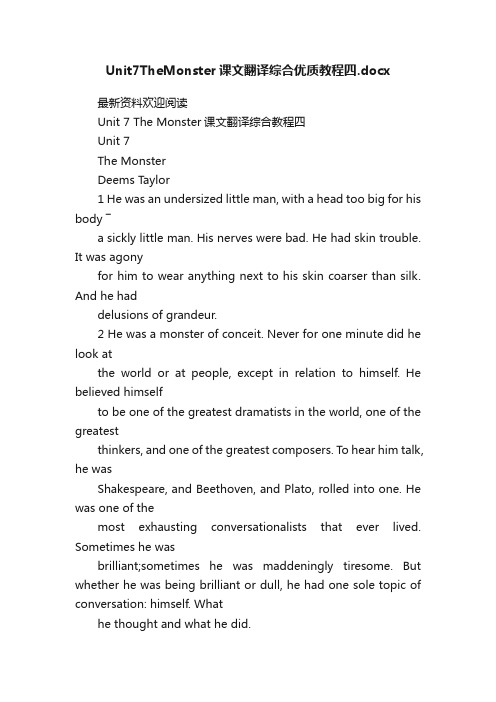
Unit7TheMonster课文翻译综合优质教程四.docx最新资料欢迎阅读Unit 7 The Monster课文翻译综合教程四Unit 7The MonsterDeems Taylor1 He was an undersized little man, with a head too big for his body ―a sickly little man. His nerves were bad. He had skin trouble. It was agonyfor him to wear anything next to his skin coarser than silk. And he haddelusions of grandeur.2 He was a monster of conceit. Never for one minute did he look atthe world or at people, except in relation to himself. He believed himselfto be one of the greatest dramatists in the world, one of the greatestthinkers, and one of the greatest composers. To hear him talk, he wasShakespeare, and Beethoven, and Plato, rolled into one. He was one of themost exhausting conversationalists that ever lived. Sometimes he wasbrilliant;sometimes he was maddeningly tiresome. But whether he was being brilliant or dull, he had one sole topic of conversation: himself. Whathe thought and what he did.3 He had a mania for being in the right. The slightest hint ofdisagreement, from anyone, on the most trivial point, was enough to sethim off on a harangue that might last for hours, in which he proved himselfright in so many ways, and with such exhausting volubility, that in theend his hearer, stunned and deafened, would agree with him,for the sakeof peace.4 It never occurred to him that he and his doing were not of the mostintense and fascinating interest to anyone with whomhe came in contact.He had theories about almost any subject under the sun,includingvegetarianism, the drama, politics, and music; and in support of thesetheories he wrote pamphlets, letters,books ... thousands upon thousandsof words,hundreds and hundreds of pages. He not only wrote these things, and published them ― usually at somebodyelse ’s expense ― but he would sit and read them aloud, for hours, to his friends, and his family.5 He had the emotional stability of a six-year-old child.Whenhe felt out of sorts, he would rave and stamp, or sink into suicidal gloom andtalk darkly of going to the East to end his days as a Buddhist monk. Tenminutes later, when something pleased him he would rushout of doors and run around the garden, or jump up and down off the sofa, or stand on hishead. He could be grief-stricken over the death of a pet dog, and couldbe callous and heartless to a degree that would have madea Romanemperor shudder.6 He was almost innocent of any sense of responsibility. He wasconvinced that the world owed him a living. In support of this belief,he borrowed money from everybody who was good for a loan― men, women, friends, or strangers. He wrote begging letters by the score, sometimesgroveling without shame,at others loftily offering his intended benefactor the privilege of contributing to his support, and being mortally offended if the recipient declined the honor.7 What money he could lay his hand on he spent like an Indian rajah.No one will ever know― certainly he never knows― how much money he owed. We do know that his greatest benefactor gave him $6,000 to pay themost pressing of his debts in one city, and a year later had to give him$16,000 to enable him to live in another city without being thrown intojail for debt.8 He was equally unscrupulous in other ways. An endless processionof women marched through his life. His first wife spent twenty yearsenduring and forgiving his infidelities.His second wife had been the wife of his most devoted friend and admirer, from whom he stole her. And evenwhile he was trying to persuade her to leave her first husband he waswriting to a friend to inquire whether he could suggest some wealthywoman― any wealthy woman ― whom he could marry for her money.9 He had a genius for making enemies. He would insult a man whodisagreed with him about the weather.He would pull endless wires in order to meet some man who admired his work and was able and anxious to be ofuse to him ― and would proceed to make a mortal enemy of him with someidiotic and wholly uncalled-for exhibition of arrogance and bad manners.A character in one of his operas was a caricature of one of the mostpowerful music critics of his day. Not content with burlesquing him, heinvited the critic to his house and read him the libretto aloud in frontof his friends.10The nameof this monster was Richard Wagner. Everything I have said about him you can find on record― in newspapers,in police reports, in the testimony of people who knew him, in his own letters,between the lines of his autobiography.And the curio us thing about this record is that it doesn’t matter in theleast.11Because this undersized,sickly,disagreeable,fascinating little man was right all the time, the joke was on us. He was one of the world’s greatest dramatists; he was a great thinker; he was one of the moststupendous musical geniuses that,up to now, the world has ever seen. The world did owe him a living.What if he did talk about himself all the time? If he talked about himself for twenty-four hours every day for the spanof his life he would not have uttered half the number of words that other men have spoken and written about him since his death.12Whenyou consider what he wrote― thirteen operas and music dramas, eleven of them still holding the stage,eight of them unquestionably worth ran king amongthe world ’s great musico-dramatic masterpieces― when you listen to what he wrote,the debts and heartaches that people had to endure from him don ’ t seem much of a price.13 What if he was faithless to his friends and to his wives? He hadone mistress to whom he was faithful to the day of his death: Music. Notfor a single moment did he ever compromise with what he believed, withwhat he dreamed. There is not a line of his music that could have beenconceived by a little mind. Even when he is dull, or downright bad, heis dull in the grand manner. Listening to his music, one does not forgive him for what he may or maynot have been. It is not amatter of forgiveness.It is a matter of being dumbwith wonder that his poor brain and body didn ’t burst under the torment of the demonof creative energy that lived inside him, struggling, clawing, scratching to be released; tearing, shriekingat him to write the music that was in him. The miracle is that what hedid in the little space of seventy years could have been done at all, evenby a great genius. Is it any wonder he had no time to be a man?畸人迪姆斯·泰勒1他是个大头小身体、病怏怏的矬子;成日神经兮兮,皮肤也有毛病。
The_Monster课文翻译
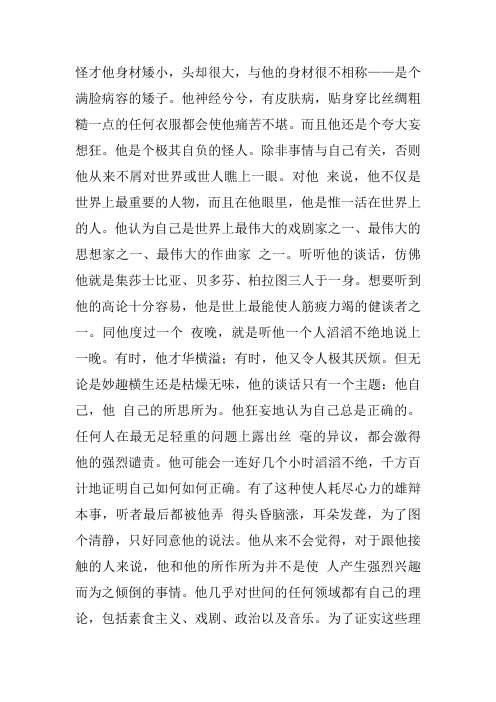
怪才他身材矮小,头却很大,与他的身材很不相称——是个满脸病容的矮子。
他神经兮兮,有皮肤病,贴身穿比丝绸粗糙一点的任何衣服都会使他痛苦不堪。
而且他还是个夸大妄想狂。
他是个极其自负的怪人。
除非事情与自己有关,否则他从来不屑对世界或世人瞧上一眼。
对他来说,他不仅是世界上最重要的人物,而且在他眼里,他是惟一活在世界上的人。
他认为自己是世界上最伟大的戏剧家之一、最伟大的思想家之一、最伟大的作曲家之一。
听听他的谈话,仿佛他就是集莎士比亚、贝多芬、柏拉图三人于一身。
想要听到他的高论十分容易,他是世上最能使人筋疲力竭的健谈者之一。
同他度过一个夜晚,就是听他一个人滔滔不绝地说上一晚。
有时,他才华横溢;有时,他又令人极其厌烦。
但无论是妙趣横生还是枯燥无味,他的谈话只有一个主题:他自己,他自己的所思所为。
他狂妄地认为自己总是正确的。
任何人在最无足轻重的问题上露出丝毫的异议,都会激得他的强烈谴责。
他可能会一连好几个小时滔滔不绝,千方百计地证明自己如何如何正确。
有了这种使人耗尽心力的雄辩本事,听者最后都被他弄得头昏脑涨,耳朵发聋,为了图个清静,只好同意他的说法。
他从来不会觉得,对于跟他接触的人来说,他和他的所作所为并不是使人产生强烈兴趣而为之倾倒的事情。
他几乎对世间的任何领域都有自己的理论,包括素食主义、戏剧、政治以及音乐。
为了证实这些理论,他写小册子、写信、写书……文字成千上万,连篇累牍。
他不仅写了,还出版了这些东西——所需费用通常由别人支付——而他会坐下来大声读给朋友和家人听,一读就是好几个小时。
他写歌剧,但往往是刚有个故事梗概,他就邀请——或者更确切说是召集——一群朋友到家里,高声念给大家听。
不是为了获得批评,而是为了获得称赞。
整部剧的歌词写好后,朋友们还得再去听他高声朗读全剧。
然后他就拿去发表,有时几年后才为歌词谱曲。
他也像作曲家一样弹钢琴,但要多糟有多糟。
然而,他却要坐在钢琴前,面对包括他那个时代最杰出的钢琴家在内的聚会人群,一小时接一小时地给他们演奏,不用说,都是他自己的作品。
完整版Unit7TheMonster课文翻译综合教程四
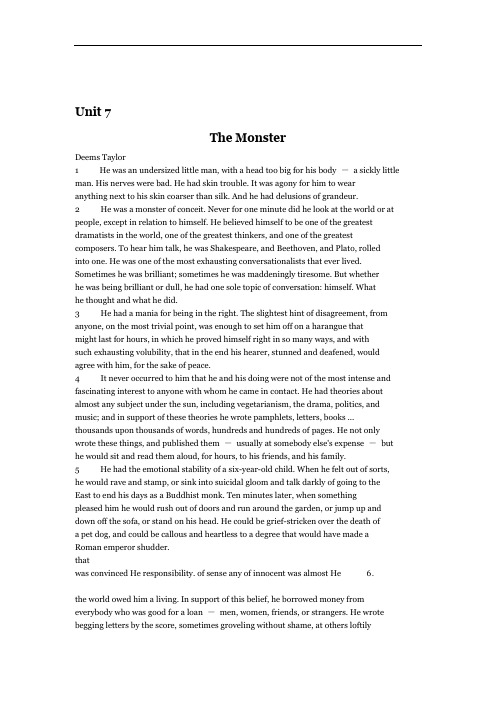
Unit 7The MonsterDeems Taylor1He was an undersized little man, with a head too big for his body ―a sickly little man. His nerves were bad. He had skin trouble. It was agony for him to wearanything next to his skin coarser than silk. And he had delusions of grandeur.2He was a monster of conceit. Never for one minute did he look at the world or at people, except in relation to himself. He believed himself to be one of the greatest dramatists in the world, one of the greatest thinkers, and one of the greatest composers. To hear him talk, he was Shakespeare, and Beethoven, and Plato, rolledinto one. He was one of the most exhausting conversationalists that ever lived. Sometimes he was brilliant; sometimes he was maddeningly tiresome. But whetherhe was being brilliant or dull, he had one sole topic of conversation: himself. Whathe thought and what he did.3He had a mania for being in the right. The slightest hint of disagreement, from anyone, on the most trivial point, was enough to set him off on a harangue thatmight last for hours, in which he proved himself right in so many ways, and withsuch exhausting volubility, that in the end his hearer, stunned and deafened, would agree with him, for the sake of peace.4It never occurred to him that he and his doing were not of the most intense and fascinating interest to anyone with whom he came in contact. He had theories about almost any subject under the sun, including vegetarianism, the drama, politics, and music; and in support of these theories he wrote pamphlets, letters, books ... thousands upon thousands of words, hundreds and hundreds of pages. He not only wrote these things, and published them ―usually at somebody else's expense ―but he would sit and read them aloud, for hours, to his friends, and his family.5He had the emotional stability of a six-year-old child. When he felt out of sorts, he would rave and stamp, or sink into suicidal gloom and talk darkly of going to the East to end his days as a Buddhist monk. Ten minutes later, when somethingpleased him he would rush out of doors and run around the garden, or jump up and down off the sofa, or stand on his head. He could be grief-stricken over the death ofa pet dog, and could be callous and heartless to a degree that would have made a Roman emperor shudder.thatwas convinced He responsibility. of sense any of innocent was almost He 6.the world owed him a living. In support of this belief, he borrowed money from everybody who was good for a loan ―men, women, friends, or strangers. He wrote begging letters by the score, sometimes groveling without shame, at others loftilyoffering his intended benefactor the privilege of contributing to his support, andbeing mortally offended if the recipient declined the honor.7What money he could lay his hand on he spent like an Indian rajah. No one will ever know ―certainly he never knows ―how much money he owed. We do know that his greatest benefactor gave him $6,000 to pay the most pressing of his debtsin one city, and a year later had to give him $16,000 to enable him to live in another city without being thrown into jail for debt.8He was equally unscrupulous in other ways. An endless procession of women marched through his life. His first wife spent twenty years enduring and forgivinghis infidelities. His second wife had been the wife of his most devoted friend and admirer, from whom he stole her. And even while he was trying to persuade her to leave her first husband he was writing to a friend to inquire whether he couldsuggest some wealthy woman ―any wealthy woman ―whom he could marry for her money.9He had a genius for making enemies. He would insult a man who disagreed with him about the weather. He would pull endless wires in order to meet some manwho admired his work and was able and anxious to be of use to him ―and would proceed to make a mortal enemy of him with some idiotic and wholly uncalled-for exhibition of arrogance and bad manners. A character in one of his operas was a caricature of one of the most powerful music critics of his day. Not content with burlesquing him, he invited the critic to his house and read him the libretto aloud in front of his friends.10The name of this monster was Richard Wagner. Everything I have said about him you can find on record ―in newspapers, in police reports, in the testimony of people who knew him, in his own letters, between the lines of his autobiography.And the curious thing about this record is that it doesn't matter in the least.11Because this undersized, sickly, disagreeable, fascinating little man was right all the time, the joke was on us. He was one of the world's greatest dramatists; he was a great thinker; he was one of the most stupendous musical geniuses that, up to now,the world has ever seen. The world did owe him a living. What if he did talk about himself all the time? If he talked about himself for twenty-four hours every day forthe span of his life he would not have uttered half the number of words that othermen have spoken and written about him since his death.12When you consider what he wrote ―thirteen operas and music dramas, eleven of them still holding the stage, eight of them unquestionably worth ranking amongthe world's great musico-dramatic masterpieces ―when you listen to what he wrote, the debts and heartaches that people had to endure from him don't seem much of a price.13What if he was faithless to his friends and to his wives? He had one mistress to whom he was faithful to the day of his death: Music. Not for a single moment did he ever compromise with what he believed, with what he dreamed. There is not a lineof his music that could have been conceived by a little mind. Even when he is dull,or downright bad, he is dull in the grand manner. Listening to his music, one doesnot forgive him for what he may or may not have been. It is not a matter offorgiveness. It is a matter of being dumb with wonder that his poor brain and bodydidn't burst under the torment of the demon of creative energy that lived inside him, struggling, clawing, scratching to be released; tearing, shrieking at him to write themusic that was in him. The miracle is that what he did in the little space of seventyyears could have been done at all, even by a great genius. Is it any wonder he had no time to be a man?畸人迪姆斯·泰勒1 他是个大头小身体、病怏怏的矬子;成日神经兮兮,皮肤也有毛病。
TheMonster歌词及翻译
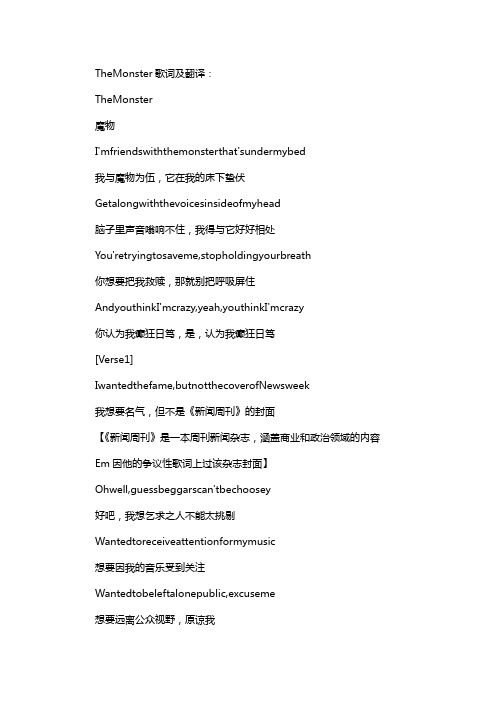
TheMonster歌词及翻译:TheMonster魔物I'mfriendswiththemonsterthat'sundermybed我与魔物为伍,它在我的床下蛰伏Getalongwiththevoicesinsideofmyhead脑子里声音嗡响不住,我得与它好好相处You'retryingtosaveme,stopholdingyourbreath你想要把我救赎,那就别把呼吸屏住AndyouthinkI'mcrazy,yeah,youthinkI'mcrazy你认为我癫狂日笃,是,认为我癫狂日笃[Verse1]Iwantedthefame,butnotthecoverofNewsweek我想要名气,但不是《新闻周刊》的封面【《新闻周刊》是一本周刊新闻杂志,涵盖商业和政治领域的内容Em因他的争议性歌词上过该杂志封面】Ohwell,guessbeggarscan'tbechoosey好吧,我想乞求之人不能太挑剔Wantedtoreceiveattentionformymusic想要因我的音乐受到关注Wantedtobeleftalonepublic,excuseme想要远离公众视野,原谅我Forwantingmycake,andeatittoo,andwantingitbothways鱼和熊掌,我想兼得,Famemademeaballooncausemyegoinflated名气让我成了个气球,因为我的自我开始膨胀WhenIblew;see,itwasconfusing——当我出了名;看见吗,这很让人迷惑CauseallIwantedtodoisbetheBruceLeeoflooseleaf因为我想要的只是成为我活页上的李小龙【Em常在笔记本的活页上随手记下他想到的歌词李小龙:著名华人武术家、武打电影演员且被认为对Hip-hop文化也有启示作用】Abusedink,useditasatoolwhenIblewsteam狂虐笔墨,在我喷射蒸汽的时候用作一种工具(Ooh!)Hitthelottery,ohwee(噢!)中了彩票,噢耶ButwithwhatIgaveuptogetwasbittersweet但我放弃那么多得来的,苦乐参半Itwaslikewinningahugemeet就好像赢了一场大比赛IroniauseIthinkI'mgettingsohugeIneedashrink真讽刺,因为我觉得我已那般巨大,我需要收缩一下/我需要个心理医生【shrink双关“缩小”和“心理医生”】I'mbeginningtolosesleep:onesheep,twosheep我开始失眠:只能数着一只羊,两只羊GoingcuckooandcookyasKoolKeith像KoolKeith一样疯狂古怪【KoolKeith:说唱歌手,因在艺术领域的精神分裂症而著名】ButI'mactuallyweirderthanyouthinkcauseI'm...但我其实比你想的要更古怪,因为我...[Hook][Bridge:Rihanna]Well,that'snothing没事,那不算什么[Verse2]No,Iain'tmuchofapoetbutIknowsomebody不,我不是个怎样的好诗人但我知道Oncetoldmetoseizethemomentanddon'tsquanderit有人曾告诉过我把握好当下,不要挥霍时光Causeyouneverknowwhenitallcouldbeovertomorrow因为你永远不知道,可能明天就是一切的终焉SoIkeepconjuring,sometimesIwonderwherethesethoughtsspawnfro m所以我不断召唤魔物,有时候我想知道这些想法念头都是哪里来的【conjuring暗指恐怖电影TheConjuring】(Yeah,ponderit,doyouwantthis?(仔细掂量,你想不想要这些东西?Nowonderyoulosingyourmind,thewayitwanders)怪不得你丧失心智,心神漫游)Yodel-odel-ay-hee-hooYodel-odel-ay-hee-hooIthinkyou'vebeenwanderingoffdownyonderandstumbledontoJeffVan Vonderen我想你的思绪已经飘到老远,碰上了JeffVanVonderen【JeffVanWonderen:干涉主义作家、演讲家、牧师】CauseIneedaninterventionisttointervenebetweenmeandthismonster 因为我需要一个干涉主义者来介入我与这个魔物Andsavemefrommyselfandallthisconflict从我自己手中,还有所有这些矛盾争斗中拯救我CausetheverythingthatIlove'skillingmeandIcan'tconquerit因为我唯爱的就是杀死自我,我无法克服MyOCDisconkingmeinthehead我的强迫症在脑袋里折磨着我Keepknocking,nobody'shome,I'msleepwalking一直敲门,但家里没人,我是在梦游I'mjustrelayingwhatthevoiceinmyheadissaying我是在传达我脑子里的声音Don'tshootthemessenger,I'mjustfriendswiththe... 别射杀我这个传信人,我只是与...[Hook+Bridge][Verse3]Callmecrazy,butIhavethisvision说我癫狂,但我看见这样的幻象OnedaythatIwalkamongstyouaregularcivilian某一天我能在你们之间作为一名普通百姓走在街上Butuntilthendrumsgetkilled但那要等到我的节奏被杀死AndI'mingstraightatMC's,bloodgetspilled我直奔MC们而去,鲜血四溅AndItakeitbacktothedaysthatIgetonaDretrack我把一切带回我还在Dre的伴奏上说唱的日子【Dr.Dre:西海岸说唱元老Em导师、老板、制作人是他发掘了Em并为他制作歌曲beat】Giveeverykidwhogotplayedat,pumpedupfeeling 给每个被欺负过的孩子们热切的感觉Andshittosaybacktothekidswhoplay'em还有用来对那些玩弄过他们的恶霸们回应的东西Iain'theretosavethefuckingchildren我并不是在这拯救操蛋的孩子们Butifonekidoutofahundredmillion但如果一亿人中的一个Whoaregoingthroughastrugglefeelsandthenrelates,that'sgreat正在历经磨难的孩子能感觉到我,并感同身受,那就足够It'spayback,RussellWilsonfallingwaybackinthedraft那就是我的回报,就像RussellWilson回到选拔的那段日子【RussellWilson:美国橄榄球运动员,因体重个头小最初没有被选上】Turnnothingintosomething,stillcanmakethat,strawintogoldchump 把无变成有,依旧能把那干草变成金块IwillspinRumpelstiltskininahaystack我会在干草堆里狂虐侏儒怪【出自德国民间故事,讲的是一个男人为了虚荣而谎称自己的女儿能把干草变成金子】MaybeIneedastraightjacketfacefacts,Iamnutsforreal或许我需要一件约束紧身装,面对现实,我确实是个疯子ButI'mokaywiththat,it'snothing,I'mstillfriendswiththe...但我没关系,这不算什么,我依旧与...2fk0f0c9d 北京治疗癫痫病的医院/jkbk/dianxian/。
TheMonster课文翻译
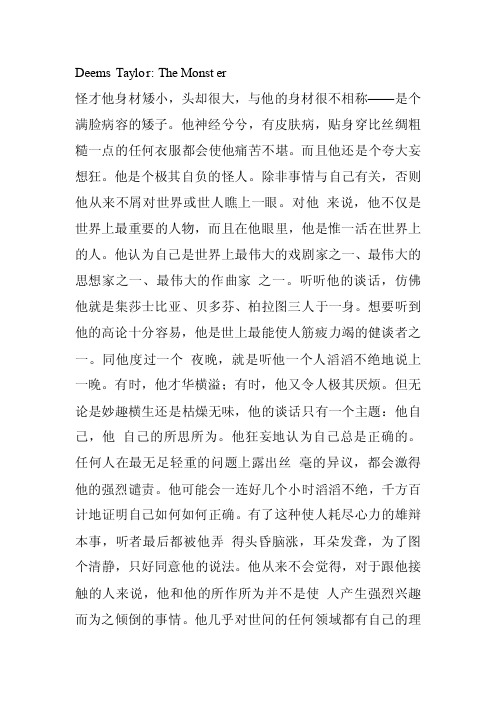
DeemsTaylor: The Monste r怪才他身材矮小,头却很大,与他的身材很不相称——是个满脸病容的矮子。
他神经兮兮,有皮肤病,贴身穿比丝绸粗糙一点的任何衣服都会使他痛苦不堪。
而且他还是个夸大妄想狂。
他是个极其自负的怪人。
除非事情与自己有关,否则他从来不屑对世界或世人瞧上一眼。
对他来说,他不仅是世界上最重要的人物,而且在他眼里,他是惟一活在世界上的人。
他认为自己是世界上最伟大的戏剧家之一、最伟大的思想家之一、最伟大的作曲家之一。
听听他的谈话,仿佛他就是集莎士比亚、贝多芬、柏拉图三人于一身。
想要听到他的高论十分容易,他是世上最能使人筋疲力竭的健谈者之一。
同他度过一个夜晚,就是听他一个人滔滔不绝地说上一晚。
有时,他才华横溢;有时,他又令人极其厌烦。
但无论是妙趣横生还是枯燥无味,他的谈话只有一个主题:他自己,他自己的所思所为。
他狂妄地认为自己总是正确的。
任何人在最无足轻重的问题上露出丝毫的异议,都会激得他的强烈谴责。
他可能会一连好几个小时滔滔不绝,千方百计地证明自己如何如何正确。
有了这种使人耗尽心力的雄辩本事,听者最后都被他弄得头昏脑涨,耳朵发聋,为了图个清静,只好同意他的说法。
他从来不会觉得,对于跟他接触的人来说,他和他的所作所为并不是使人产生强烈兴趣而为之倾倒的事情。
他几乎对世间的任何领域都有自己的理论,包括素食主义、戏剧、政治以及音乐。
为了证实这些理论,他写小册子、写信、写书……文字成千上万,连篇累牍。
他不仅写了,还出版了这些东西——所需费用通常由别人支付——而他会坐下来大声读给朋友和家人听,一读就是好几个小时。
他写歌剧,但往往是刚有个故事梗概,他就邀请——或者更确切说是召集——一群朋友到家里,高声念给大家听。
现代大学英语精读1 UNIT16 The Monsters Are Due in Mple Street 课文翻译
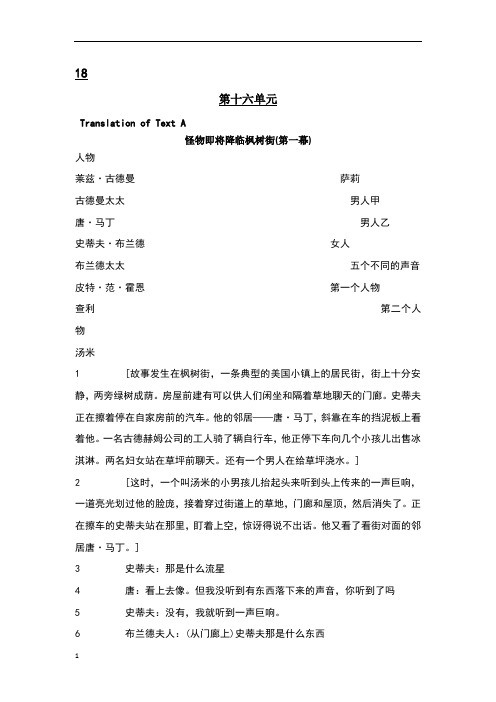
18第十六单元Translation of Text A怪物即将降临枫树街(第一幕)人物莱兹·古德曼萨莉古德曼太太男人甲唐·马丁男人乙史蒂夫·布兰德女人布兰德太太五个不同的声音皮特·范·霍恩第一个人物查利第二个人物汤米1 [故事发生在枫树街,一条典型的美国小镇上的居民街,街上十分安静,两旁绿树成荫。
房屋前建有可以供人们闲坐和隔着草地聊天的门廊。
史蒂夫正在擦着停在自家房前的汽车。
他的邻居——唐·马丁,斜靠在车的挡泥板上看着他。
一名古德赫姆公司的工人骑了辆自行车,他正停下车向几个小孩儿出售冰淇淋。
两名妇女站在草坪前聊天。
还有一个男人在给草坪浇水。
]2 [这时,一个叫汤米的小男孩儿抬起头来听到头上传来的一声巨响,一道亮光划过他的脸庞,接着穿过街道上的草地,门廊和屋顶,然后消失了。
正在擦车的史蒂夫站在那里,盯着上空,惊讶得说不出话。
他又看了看街对面的邻居唐·马丁。
]3 史蒂夫:那是什么流星4 唐:看上去像。
但我没听到有东西落下来的声音,你听到了吗5 史蒂夫:没有,我就听到一声巨响。
6 布兰德夫人:(从门廊上)史蒂夫那是什么东西7 史蒂夫:亲爱的,我猜是颗流星。
飞得太近了,不是吗8 布兰德太太:太近了!(人们站在门廊前,一边观察一边低声交谈着。
我们看到一个男人正在前门廊上拧灯泡,然后从凳子上下来去打开开关,但灯没有亮。
另一个男人正在摆弄电动割草机。
他把插头插入插座,反复按着开关,但割草机没有任何反应。
透过前门廊的一扇窗户,人们可以看到一位妇女正在打电话。
)9 女人:接线员,接线员,电话坏了,接线员!10 (布兰德太太从屋里走出来到门廊上。
)布兰德太太:(喊到)史蒂夫,停电了。
我还在炉子上煮着汤呢,可炉子刚刚没电了。
11 女人:这儿也是。
电话也打不通了。
电话好像坏了。
12 第一个声音:停电了。
13 第二个声音:电话不通了。
14 第三个声音:收音机什么也收不到。
现代大学英语精读1 UNIT16 The Monsters Are Due in Mple Street 课文翻译
2014101018第十六单元Translation of Text A怪物即将降临枫树街(第一幕)人物莱兹·古德曼萨莉古德曼太太男人甲唐·马丁男人乙史蒂夫·布兰德女人布兰德太太五个不同的声音皮特·范·霍恩第一个人物查利第二个人物汤米1 [故事发生在枫树街,一条典型的美国小镇上的居民街,街上十分安静,两旁绿树成荫。
房屋前建有可以供人们闲坐和隔着草地聊天的门廊。
史蒂夫正在擦着停在自家房前的汽车。
他的邻居——唐·马丁,斜靠在车的挡泥板上看着他。
一名古德赫姆公司的工人骑了辆自行车,他正停下车向几个小孩儿出售冰淇淋。
两名妇女站在草坪前聊天。
还有一个男人在给草坪浇水。
]2 [这时,一个叫汤米的小男孩儿抬起头来听到头上传来的一声巨响,一道亮光划过他的脸庞,接着穿过街道上的草地,门廊和屋顶,然后消失了。
正在擦车的史蒂夫站在那里,盯着上空,惊讶得说不出话。
他又看了看街对面的邻居唐·马丁。
]3 史蒂夫:那是什么?流星?4 唐:看上去像。
但我没听到有东西落下来的声音,你听到了吗?5 史蒂夫:没有,我就听到一声巨响。
6 布兰德夫人:(从门廊上)史蒂夫?那是什么东西?7 史蒂夫:亲爱的,我猜是颗流星。
飞得太近了,不是吗?8 布兰德太太:太近了!(人们站在门廊前,一边观察一边低声交谈着。
我们看到一个男人正在前门廊上拧灯泡,然后从凳子上下来去打开开关,但灯没有亮。
另一个男人正在摆弄电动割草机。
他把插头插入插座,反复按着开关,但割草机没有任何反应。
透过前门廊的一扇窗户,人们可以看到一位妇女正在打电话。
)9 女人:接线员,接线员,电话坏了,接线员!10 (布兰德太太从屋里走出来到门廊上。
)布兰德太太:(喊到)史蒂夫,停电了。
我还在炉子上煮着汤呢,可炉子刚刚没电了。
11 女人:这儿也是。
电话也打不通了。
电话好像坏了。
12 第一个声音:停电了。
13 第二个声音:电话不通了。
Unit 7 The Monster课文翻译综合教程四【优质文档】
Unit 7The MonsterDeems Taylor1He was an undersized little man, with a head too big for his body ― a sickly little man. His nerves were bad. He had skin trouble. It was agony for him to wear anything next to his skin coarser than silk. And he had delusions of grandeur.2He was a monster of conceit. Never for one minute did he look at the world or at people, except in relation to himself. He believed himself to be one of the greatest dramatists in the world, one of the greatest thinkers, and one of the greatest composers. To hear him talk, he was Shakespeare, and Beethoven, and Plato, rolled into one. He was one of the most exhausting conversationalists that ever lived.Sometimes he was brilliant; sometimes he was maddeningly tiresome. But whether he was being brilliant or dull, he had one sole topic of conversation: himself. What he thought and what he did.3He had a mania for being in the right. The slightest hint of disagreement, from anyone, on the most trivial point, was enough to set him off on a harangue that might last for hours, in which he proved himself right in so many ways, and with such exhausting volubility, that in the end his hearer, stunned and deafened, would agree with him, for the sake of peace.4It never occurred to him that he and his doing were not of the most intense and fascinating interest to anyone with whom he came in contact. He had theories about almost any subject under the sun, including vegetarianism, the drama, politics, and music; and in support of these theories he wrote pamphlets, letters, books ...thousands upon thousands of words, hundreds and hundreds of pages. He not only wrote these things, and published them ― usually at somebody else’s expense ― but he would sit and read them aloud, for hours, to his friends, and his family.5He had the emotional stability of a six-year-old child. When he felt out of sorts, he would rave and stamp, or sink into suicidal gloom and talk darkly of going to the East to end his days as a Buddhist monk. Ten minutes later, when something pleased him he would rush out of doors and run around the garden, or jump up and down off the sofa, or stand on his head. He could be grief-stricken over the death ofa pet dog, and could be callous and heartless to a degree that would have made aRoman emperor shudder.6He was almost innocent of any sense of responsibility. He was convinced thatthe world owed him a living. In support of this belief, he borrowed money from everybody who was good for a loan ― men, women, friends, or strange rs. He wrote begging letters by the score, sometimes groveling without shame, at others loftily offering his intended benefactor the privilege of contributing to his support, and being mortally offended if the recipient declined the honor.7What money he could lay his hand on he spent like an Indian rajah. No one will ever know ― certainly he never knows ― how much money he owed. We do know that his greatest benefactor gave him $6,000 to pay the most pressing of his debts in one city, and a year later had to give him $16,000 to enable him to live in another city without being thrown into jail for debt.8He was equally unscrupulous in other ways. An endless procession of women marched through his life. His first wife spent twenty years enduring and forgiving his infidelities. His second wife had been the wife of his most devoted friend and admirer, from whom he stole her. And even while he was trying to persuade her to leave her first husband he was writing to a friend to inquire whether he could suggest some wealthy woman ― any wealthy woman ― whom he could marry for her money.9He had a genius for making enemies. He would insult a man who disagreed with him about the weather. He would pull endless wires in order to meet some man who admired his work and was able and anxious to be of use to him ― and would proceed to make a mortal enemy of him with some idiotic and wholly uncalled-for exhibition of arrogance and bad manners. A character in one of his operas was a caricature of one of the most powerful music critics of his day. Not content with burlesquing him, he invited the critic to his house and read him the libretto aloud in front of his friends.10The name of this monster was Richard Wagner. Everything I have said about him you can find on record ― in newspapers, in police reports, in the testimony of people who knew him, in his own letters, between the lines of his autobiography.And the curious thing about this record is that it doesn’t matter in the least.11Because this undersized, sickly, disagreeable, fascinating little man was right all the time, the joke was on us. He was one of the world’s greatest dramatists; he was a great thinker; he was one of the most stupendous musical geniuses that, up to now, the world has ever seen. The world did owe him a living. What if he did talk about himself all the time? If he talked about himself for twenty-four hours every day for the span of his life he would not have uttered half the number of words that othermen have spoken and written about him since his death.12When you consider what he wrote ― thirteen operas and music dramas, eleven of them still holding the stage, eight of them unquestionably worth ranking among the world’s great musico-dramatic masterpieces ― when you listen to what he wrote, the debts and heartaches that people had to endure from him don’t seem much of a price.13What if he was faithless to his friends and to his wives? He had one mistress to whom he was faithful to the day of his death: Music. Not for a single moment did he ever compromise with what he believed, with what he dreamed. There is not a line of his music that could have been conceived by a little mind. Even when he is dull, or downright bad, he is dull in the grand manner. Listening to his music, one does not forgive him for what he may or may not have been. It is not a matter of forgiveness. It is a matter of being dumb with wonder that his poor brain and body didn’t burst under the torment of the demon of creative energy that lived inside him, struggling, clawing, scratching to be released; tearing, shrieking at him to write the music that was in him. The miracle is that what he did in the little space of seventy years could have been done at all, even by a great genius. Is it any wonder he had no time to be a man?畸人迪姆斯·泰勒1 他是个大头小身体、病怏怏的矬子;成日神经兮兮,皮肤也有毛病。
Unit 7 The Monster课文翻译综合教程四
Unit 7The MonsterDeems Taylor1He was an undersized little man, with a head too big for his body ― a sickly little man. His nerves were bad. He had skin trouble. It was agony for him to wear anything next to his skin coarser than silk. And he had delusions of grandeur.2He was a monster of conceit. Never for one minute did he look at the world or at people, except in relation to himself. He believed himself to be one of the greatest dramatists in the world, one of the greatest thinkers, and one of the greatest composers. To hear him talk, he was Shakespeare, and Beethoven, and Plato, rolled into one. He was one of the most exhausting conversationalists that ever lived.Sometimes he was brilliant; sometimes he was maddeningly tiresome. But whether he was being brilliant or dull, he had one sole topic of conversation: himself. What he thought and what he did.3He had a mania for being in the right. The slightest hint of disagreement, from anyone, on the most trivial point, was enough to set him off on a harangue that might last for hours, in which he proved himself right in so many ways, and with such exhausting volubility, that in the end his hearer, stunned and deafened, would agree with him, for the sake of peace.4It never occurred to him that he and his doing were not of the most intense and fascinating interest to anyone with whom he came in contact. He had theories about almost any subject under the sun, including vegetarianism, the drama, politics, and music; and in support of these theories he wrote pamphlets, letters, books ...thousands upon thousands of words, hundreds and hundreds of pages. He not only wrote these things, and published them ― usually at somebody else’s expense ― but he would sit and read them aloud, for hours, to his friends, and his family.5He had the emotional stability of a six-year-old child. When he felt out of sorts, he would rave and stamp, or sink into suicidal gloom and talk darkly of going to the East to end his days as a Buddhist monk. Ten minutes later, when something pleased him he would rush out of doors and run around the garden, or jump up and down off the sofa, or stand on his head. He could be grief-stricken over the death ofa pet dog, and could be callous and heartless to a degree that would have made aRoman emperor shudder.6He was almost innocent of any sense of responsibility. He was convinced thatthe world owed him a living. In support of this belief, he borrowed money from everybody who was good for a loan ― men, women, friends, or strange rs. He wrote begging letters by the score, sometimes groveling without shame, at others loftily offering his intended benefactor the privilege of contributing to his support, and being mortally offended if the recipient declined the honor.7What money he could lay his hand on he spent like an Indian rajah. No one will ever know ― certainly he never knows ― how much money he owed. We do know that his greatest benefactor gave him $6,000 to pay the most pressing of his debts in one city, and a year later had to give him $16,000 to enable him to live in another city without being thrown into jail for debt.8He was equally unscrupulous in other ways. An endless procession of women marched through his life. His first wife spent twenty years enduring and forgiving his infidelities. His second wife had been the wife of his most devoted friend and admirer, from whom he stole her. And even while he was trying to persuade her to leave her first husband he was writing to a friend to inquire whether he could suggest some wealthy woman ― any wealthy woman ― whom he could marry for her money.9He had a genius for making enemies. He would insult a man who disagreed with him about the weather. He would pull endless wires in order to meet some man who admired his work and was able and anxious to be of use to him ― and would proceed to make a mortal enemy of him with some idiotic and wholly uncalled-for exhibition of arrogance and bad manners. A character in one of his operas was a caricature of one of the most powerful music critics of his day. Not content with burlesquing him, he invited the critic to his house and read him the libretto aloud in front of his friends.10The name of this monster was Richard Wagner. Everything I have said about him you can find on record ― in newspapers, in police reports, in the testimony of people who knew him, in his own letters, between the lines of his autobiography.And the curious thing about this record is that it doesn’t matter in the least.11Because this undersized, sickly, disagreeable, fascinating little man was right all the time, the joke was on us. He was one of the world’s greatest dramatists; he was a great thinker; he was one of the most stupendous musical geniuses that, up to now, the world has ever seen. The world did owe him a living. What if he did talk about himself all the time? If he talked about himself for twenty-four hours every day for the span of his life he would not have uttered half the number of words that othermen have spoken and written about him since his death.12When you consider what he wrote ― thirteen operas and music dramas, eleven of them still holding the stage, eight of them unquestionably worth ranking among the world’s great musico-dramatic masterpieces ― when you listen to what he wrote, the debts and heartaches that people had to endure from him don’t seem much of a price.13What if he was faithless to his friends and to his wives? He had one mistress to whom he was faithful to the day of his death: Music. Not for a single moment did he ever compromise with what he believed, with what he dreamed. There is not a line of his music that could have been conceived by a little mind. Even when he is dull, or downright bad, he is dull in the grand manner. Listening to his music, one does not forgive him for what he may or may not have been. It is not a matter of forgiveness. It is a matter of being dumb with wonder that his poor brain and body didn’t burst under the torment of the demon of creative energy that lived inside him, struggling, clawing, scratching to be released; tearing, shrieking at him to write the music that was in him. The miracle is that what he did in the little space of seventy years could have been done at all, even by a great genius. Is it any wonder he had no time to be a man?畸人迪姆斯·泰勒1 他是个大头小身体、病怏怏的矬子;成日神经兮兮,皮肤也有毛病。
The Monster
The MonsterDeems TaylorHe was an undersized little man, with a head too big for his body-a sickly little man. His nerves were bad. He had skin trouble. It was agony for him to wear anything next to his skin coarser than silk. And he had delusions of grandeur.He was a monster of conceit. Never for one minute did he look at the world or at people, except in relation to himself. He was not only the most important person in the world, to himself; in his own eyes he was the only person who existed. He believed himself to be one of the greatest dramatists in the world, one of the greatest thinkers, and one of the greatest composers.To hear him talk, he was Shakespeare, and Beethoven, and Plato, rolled into one. And you would have had no difficulty in hearing him talk. He was one of the most exhausting conversationalists that ever lived. An evening with him was an evening spent in listening to a monologue.Sometimes he was brilliant; sometimes he was maddeningly tiresome.But whether he was being brilliant or dull, he had one sole topic of conversation: himself. What he thought and what he did.He had a mania for being in the right. The slightest hint of disagreement, from anyone, on the most trivial point, was enough to set him off on a harangue that might last for hours, in which he proved himself right in so many ways, and with such exhausting volubility, that in the end his hearer, stunned and deafened, would agree with him, for the sake of peace.参考译文:怪杰狄姆·泰勒他五短身材,头倒挺大,与身躯极不相称--是个一副病态的矮子。
- 1、下载文档前请自行甄别文档内容的完整性,平台不提供额外的编辑、内容补充、找答案等附加服务。
- 2、"仅部分预览"的文档,不可在线预览部分如存在完整性等问题,可反馈申请退款(可完整预览的文档不适用该条件!)。
- 3、如文档侵犯您的权益,请联系客服反馈,我们会尽快为您处理(人工客服工作时间:9:00-18:30)。
Deems Taylor: The Monster
怪才他身材矮小,头却很大,与他的身材很不相称——是个满脸病容的矮子。
他神经兮兮,有皮肤病,贴身穿比丝绸粗糙一点的任何衣服都会使他痛苦不堪。
而且他还是个夸大妄想狂。
他是个极其自负的怪人。
除非事情与自己有关,否则他从来不屑对世界或世人瞧上一眼。
对他来说,他不仅是世界上最重要的人物,而且在他眼里,他是惟一活在世界上的人。
他认为自己是世界上最伟大的戏剧家之一、最伟大的思想家之一、最伟大的作曲家之一。
听听他的谈话,仿佛他就是集莎士比亚、贝多芬、柏拉图三人于一身。
想要听到他的高论十分容易,他是世上最能使人筋疲力竭的健谈者之一。
同他度过一个夜晚,就是听他一个人滔滔不绝地说上一晚。
有时,他才华横溢;有时,他又令人极其厌烦。
但无论是妙趣横生还是枯燥无味,他的谈话只有一个主题:他自己,他自己的所思所为。
他狂妄地认为自己总是正确的。
任何人在最无足轻重的问题上露出丝毫的异议,都会激得他的强烈谴责。
他可能会一连好几个小时滔滔不绝,千方百计地证明自己如何如何正确。
有了这种使人耗尽心力的雄辩本事,听者最后都被他弄得头昏脑涨,耳朵发聋,为了图个清静,只好同意他的说法。
他从来不会觉得,对于跟他接触的人来说,他和他的所作所为并不是使人产生强烈兴趣而为之倾倒的事情。
他几乎对世间的任何领域都有自己的理
论,包括素食主义、戏剧、政治以及音乐。
为了证实这些理论,他写小册子、写信、写书……文字成千上万,连篇累牍。
他不仅写了,还出版了这些东西——所需费用通常由别人支付——而他会坐下来大声读给朋友和家人听,一读就是好几个小时。
他写歌剧,但往往是刚有个故事梗概,他就邀请——或者更确切说是召集——一群朋友到家里,高声念给大家听。
不是为了获得批评,而是为了获得称赞。
整部剧的歌词写好后,朋友们还得再去听他高声朗读全剧。
然后他就拿去发表,有时几年后才为歌词谱曲。
他也像作曲家一样弹钢琴,但要多糟有多糟。
然而,他却要坐在钢琴前,面对包括他那个时代最杰出的钢琴家在内的聚会人群,一小时接一小时地给他们演奏,不用说,都是他自己的作品。
他有一副作曲家的嗓子,但他会把著名的歌唱家请到自己家里,为他们演唱自己的作品,还要扮演剧中所有的角色。
他的情绪犹如六岁儿童,极易波动。
心情不好时,他要么用力跺脚,口出狂言,要么陷入极度的忧郁,阴沉地说要去东方当和尚,了此残生。
十分钟后,假如有什么事情使他高兴了,他就会冲出门去,绕着花园跑个不停,或者在沙发上跳上跳下或拿大顶。
他会因爱犬死了而极度悲痛,也会残忍无情到使罗马皇帝也不寒而栗。
他几乎没有丝毫责任感。
他似乎不仅没有养活自己的能力,也从没想到过有这个义务。
他深信这个世界应该给他一条活路。
为了支持这一信念,他
向一切借得着钱的人借债——不管是男是女,也不管是朋友还是陌路人。
求助信他一写就是二十封——有时卑躬屈膝,不顾羞耻,有时又趾高气扬地授予他预期的资助人资助他的殊荣,要是对方谢绝这一荣誉,他会气得要死。
我还没见到如果债主不告上法庭他会主动付帐或还钱的记录。
只要他能弄到钱,他花起来总是像个印度王公。
只要他的某部歌剧一有上演的可能,他便会马上肆意花钱,迅速积欠一笔十倍于预期所得版税的债务。
没有人搞得清楚——他自己肯定也不清楚——他欠了多少钱。
但我们确实知道,他的一位最慷慨的资助人曾给他六千美元偿还他在某市最急迫的债务;一年之后,不得不再给他一万六千美元,使他得以在另一城市安身,而不致因欠债去坐牢。
他在其他方面也是放荡不羁。
无数个女人曾进入过他的生活。
他的发妻与他一起生活了二十年,是在不停地忍受和原谅他的不忠中度过的。
他的第二个妻子本是最崇拜他、对他最忠实的朋友的妻子,他从好友手中夺走了她。
他甚至在劝说她离开第一个丈夫之际,还同时写信给一个朋友,询问能否给他介绍个阔妇人——有钱就行——他可以为了金钱跟她结婚。
他在其他私人交往中也极端自私。
他对朋友有无好感,完全取决于他们对他是否绝对忠诚,抑或他们在经济上或艺术上对他是否有用。
一旦他们使他失望——即使是拒绝赴宴之类的小事——或者他们对他不再那么有用,他就会毫不犹豫
地与他们断绝来往。
在他生命的最后日子里,他只剩下了一个朋友,就连这个朋友也还是他在中年时才认识的。
这位怪才的名字叫理查德·瓦格纳。
我所谈到的关于他的一切情况都有记录可查——包括报纸、警方报告、认识他的人的证词、他本人的信件以及他的自传。
但令人奇怪的是,这种记录对他的名望丝毫无损。
因为,这个身材矮小、满脸病容、脾气古怪、令人着迷的小个子自始至终都是对的。
该受嘲笑的是我们。
他是全世界最伟大的剧作家之一,一位伟大的思想家,是迄今为止全世界最了不起的音乐天才之一。
这个世界确实应该养活他。
当你掂量他的作品时——十三部歌剧和音乐剧,其中十一部仍然长演不衰,八部当之无愧地位于世界音乐剧伟大名作之列——当你聆听他的作品时,他欠债不还也好,伤透人心也罢,这些代价似乎都不算什么。
想一想命运至少曾一度赐给拿破仑,那个断送法国、洗劫欧洲的人何种的奢华吧。
相比之下,你也许会同意,用几千元的债务来换得《指环》三部曲并不太贵。
即使他不忠于朋友和妻子,又有什么关系呢?他有一位他至死都忠贞不渝的情侣:音乐。
他一刻也没有动摇过自己的信念和憧憬。
他的作品中没有一行乐谱是平庸之辈构想得出的。
即使他有枯燥乏味或极其糟糕的作品,其乏味中仍可见伟大之处。
他最糟的败笔中也有不凡之处。
人们聆听他的乐曲时,并不因他也许曾是或不是什么样的人而宽恕他。
这不是宽恕不宽恕的问
题。
这是件令人惊讶得目瞪口呆的事情——他体内无限的创造力,像魔鬼般拼命挣扎、又挖又挠试图冲出体外;这恶魔撕扯着他,冲他狂叫,要他谱写出藏于体内的乐曲。
遭受如此痛苦的折磨,他那可怜的脑袋和身躯竟没有被压垮,这岂不是人间奇迹?而真正的奇迹在于,短短七十年,他居然完成了那么多的工作,即使是一个伟大的天才,也难以做到。
因此他没有时间过常人的生活,这又有什么好奇怪的
呢?
《青铜葵花》阅读测试题
一、填空题
1. 河那边的村庄有一个很好听的的名字()。
2.大麦地的人把城市里的人称作()。
3.大麦地有一个祖祖辈辈养鸭的男孩名叫()。
4. 起风了,芦苇荡好像忽然成了(),成千上万的(),挥舞着绿色的(),在天空下有板有眼地()起来,四下里发出沙拉沙拉的声音,大芦苇荡,既吸引着葵花,也使她感到()。
5.为了家里盖房子,奶奶当掉了身上的()。
为了给青铜和葵花做顿吃的,奶奶用()换来一小袋小米。
奶奶临走前,示意妈妈将她胳膊上的()抹下,要送给葵花做嫁妆。
6. 葵花的父亲死后,她被()领养。
7. 青铜的家像一辆()。
自从这辆马车上多了葵花,它就显得()。
8. 或许是(),或许是(),所以一双双芦花鞋卖了出去。
9.那串青铜给葵花的项链是用一颗颗(),细心的做出来的。
10.青铜会说话了,他说的话是:“()”!
11.《青铜葵花》是一部()小说,作者是现代作家()。
他的其他作品有()()()等。
12.青铜五岁那年的一个深夜,大麦地遇到一场(),他持续高烧()天,后来变成了()。
13.葵花全家使用计谋,用了()方法决定谁先上学,约定好谁摸到(),谁就上学。
14.葵花教会青铜()青铜在墙上写出( )让在场的人目瞪口呆。
15.因为蝗虫闹灾,大麦地与五七干校的粮食无收,青铜与葵花出门找吃的,他们看到天空中朵朵白云,葵花说是()和()。
16.葵花决定去江南捡()卖钱,为奶奶治病,临行前请()转交给青铜,结果未能及时交到青铜之手。
17.奶奶在葵花去江南拾银杏回来的第()天去世的。
18.青铜见到河边停靠着一艘白轮船,以为是来接葵花去城里,忙去学校接葵花躲藏起来,原来是县长来()。
19.村长受市长之托,寻找葵花,结果葵花和青铜藏在了()的船里。
20.来接葵花回城里的两位阿姨分别是()和()。
21、青铜为了让葵花安心的看马戏,与一帮男孩争()而发生斗殴事件,最后葵花()才看得了马戏。
二、选择题
1 .把葵花从小木船上“救”下来的人是()。
A、嘎鱼 B、青铜 C、葵花的爸爸
2. 青铜是()。
A、聋子 B、瞎子 C、哑巴
3.葵花的爸爸是()死的。
A、被火烧死的
B、从天上掉下来摔死的
C、掉进河里淹死的
4.葵花被()一家领养。
A、青铜 B、嘎鱼 C、朱国
5.给油麻地小学拍照的人叫做()。
A、张瘸子 B、刘瘸 C、王瘸子。
